
We speak with Pulitzer Prize-winning journalists Carol Leonnig and Aaron Davis on the day they publish their new book, Injustice: How Politics and Fear Vanquished America’s Justice Department, which looks at how the DOJ during the Biden administration was overly cautious in pursuing cases against Trump and his allies over 2020 election interference, the January 6 riot and more. Attorney General Merrick Garland felt it was important to “turn the page from Donald Trump” and not look too closely at abuses of power, says Leonnig, who also stresses many “stubbornly brave people … tried to do the right thing and could not succeed in this institution.”
Transcript
AMY GOODMAN: This is Democracy Now!, democracynow.org. I’m Amy Goodman, with Juan González.
We spend the rest of the hour with two Pulitzer Prize-winning reporters who have a blockbuster new book out today. It’s called Injustice: How Politics and Fear Vanquished America’s Justice Department. Carol Leonnig and Aaron Davis join us now in our New York studio. Carol is a longtime investigative reporter who worked at The Washington Post from 2000 to, well, just recently, this year, a quarter of a century, five-time Pulitzer Prize winner. Aaron Davis is an investigative reporter with The Washington Post, who’s twice won the Pulitzer Prize.
We welcome you both to Democracy Now! You write in the introduction, quote, “the Department of Justice collided violently with Donald Trump in his rise to power, and for the first time in history, our nation’s rule of law was brought to the precipice of collapse,” unquote. If you can talk about how the Department of Justice’s core mission unraveled under Trump? I mean, the title of your book is Injustice.
CAROL LEONNIG: You know, Amy, thanks for having us, first off.
It is amazing to both Aaron and me, as we went through this process of reporting, how much more damaging Donald Trump’s first presidency was to the core of the Justice Department. People there were individually targeted by a president, something that had never happened before. They were humiliated. Their careers were tarnished. Some of their careers were ruined. They were put under investigation by Republicans at Donald Trump’s behest. The targeting left scars that weakened the resolve. His brand of bare knuckles kind of attacks changed the trajectory of what the Justice Department would do when Joe Biden ultimately took office.
JUAN GONZÁLEZ: One of the stories, the amazing stories that you tell, are about this reporting into Trump’s relationship with the Egyptian government early on and $10 million that was supposedly being funneled, or attempted to be funneled, by Egyptian President Abdel Fattah el-Sisi to Trump. Could you talk about that and how the Justice Department tried to investigate that?
CAROL LEONNIG: You know, I’d like Aaron to do it. He would be great for this.
AMY GOODMAN: And, Aaron, as you do it, why don’t we go back just a few weeks ago to the signing of the so-called ceasefire in Sharm el-Sheikh? There was President Trump. There was the Egyptian President el-Sisi. And this is what Trump said.
PRESIDENT DONALD TRUMP: There was a reason we chose Egypt: because you were very helpful and very, very helpful. Everybody wanted to have this, but we really thought it was appropriate. And you are a great leader. You have very little crime. You have problems that other countries don’t have. And, of course, nothing is perfect, but the job you do is amazing, and I want to thank you. Another one, he’s been my friend right from the beginning, during the campaign against crooked Hillary Clinton. Have you heard of her?
AMY GOODMAN: So, he ends with “crooked Hillary.” Why is he bringing her up as they’re signing this so-called ceasefire in Sharm el-Sheikh? Talk about what you exposed.
AARON DAVIS: Well, I did see some people take note of that comment just a few weeks ago. To Carol’s point, where we started here a minute ago, you know, we did look at the Department of Justice and, like, why did the investigations into Trump go so slowly when you got to January 6th. And if you back up, you do realize that, you know, things happened. A lot of things happened that we knew inside the Justice Department. There are things we didn’t know that happened inside the Justice Department, that really made people feel reticent to go after Trump again and to really look hard at him.
And one of them was this investigation into Egypt and whether Donald Trump had taken a foreign campaign contribution from the government of Egypt, specifically one that U.S. intelligence had information from an informant that it was directed specifically by the president of Egypt, Abdel Fattah el-Sisi, in the run-up to the first election, when he was running against Hillary Clinton.
AMY GOODMAN: When he was out of money, Trump, and his own campaign folks were saying, “You’ve got to put your own money into this.”
AARON DAVIS: At a very critical moment. I mean, this was — it’s hard to remember, but Donald Trump was forecasted to lose that election against Hillary Clinton. It was a big surprise back in 2016. He was reticent to put in any more money into his own campaign. They could barely fund the rest of the campaign commercials that they had already promised to pay for.
And so, you know, suddenly there’s this largest contribution to Donald Trump’s campaign ever, by himself, $10 million. And that just happens to be right at this exact same time that the U.S. intelligence is hearing from an informant that el-Sisi is sending $10 million to Trump. And so, those comments, combined with some —
AMY GOODMAN: In two bags, that weighed 200 pounds, almost the entire —
AARON DAVIS: I did bury the lede, yes.
AMY GOODMAN: — what, the Egyptian government, it was almost all the U.S. currency they had.
AARON DAVIS: So, our reporting is that, in fact, yes, there was $10 million, that it wasn’t just that they had informants saying it. The Mueller investigation had found that, in fact, there were two bags, weighing some 200 pounds total, of U.S. $100 bills that left a bank in Egypt near the Cairo airport from an account that was controlled by the government, the government secret service, essentially. And so they tried to track that back and see if that ever came to Trump.
But the Mueller investigation was hesitant to look directly into Trump’s bank accounts, specifically after he had gone into the White House. And then that continued when other political appointees also said, “We don’t really need to go there. Is there really a predicate for this investigation?” And they allowed that Egypt investigation to die a slow death inside the Department of Justice, even to the point of when one of the new Trump’s appointees comes in, they have this briefing we recount in the book: “And here’s what we’ve got. We’ve got $10 million coming out of this bank account.” And the acting U.S. attorney says, in D.C., “Who outside this room knows about this investigation?” And everybody walks out of the meeting saying, “Well, that’s the end of that. They’re not going to do — they’re really not going to go after Trump and look at this seriously.”
JUAN GONZÁLEZ: Could you talk, as well, Aaron, about the federal judge’s reactions when Bill Barr was attorney general and there were investigations of Roger Stone and Michael Flynn?
AARON DAVIS: Again, these were, you know, cases where prosecutors and agents who worked these, who felt these cases were, you know, really locked down — I mean, in Flynn’s case, you had someone who admitted twice to the FBI having lied to investigators. With Stone, they had, you know, evidence that he had tried to extort or to push one of the witnesses in the case not to testify. And there, in that case, prosecutors from — political appointees, from main Justice, working under Bill Barr, had said, “We’re going to take this a different direction. We’re going to not have the sentencing recommendation as many years, nine years, as you’ve looked at and assigned as appropriate under the federal sentencing guidelines. That’s too much.” And, you know, some of this came out in the open. But there were the conversations inside the Department of Justice, inside the U.S. Attorney’s Office, where you could really feel the pressure brought to bear on these line attorneys.
In the Flynn case, there’s even an episode that’s new to the book, where one of the prosecutors, when they are ultimately dropping the case against Flynn, the prosecutors are brought in — said, “You signed this document that is filing for court that says, you know, you didn’t — you know, we’re going to drop the case, that there’s no reason to investigate it. And if you — and in that filing were lines that said, 'And the U.S. government says you've done no wrongdoing in trying to, you know, seek out this prosecution of Flynn.’” Well, it was kind of a carrot, and the stick later comes when they decide they’re not going to sign it, and the government — and under Barr, the political appointees take out those lines from the filing, and so then that exposes the prosecutors for the government to lawsuits, to internal investigations of whether they had acted appropriately in trying to seek a conviction of Michael Flynn.
CAROL LEONNIG: You know, you asked about the judge’s reaction, though, and that’s — I love Aaron’s summary, but the judge’s reaction in the bench at the time was horror that Bill Barr was — Donald Trump’s AG, was forcing the prosecutors to do something different than what they would normally do. And they were furious. And the federal judge, who was the chief judge of that court, told the acting U.S. attorney, that had been inserted by Donald — forgive me, inserted by Bill Barr, to basically kill the Flynn case and to scale back the Roger Stone sentencing. The federal judge, we learned, had a meeting with that acting U.S. attorney and said, “I’m sorry. We can no longer support you to continue as the chief prosecutor for the land. I can’t support you. My bench can’t support you. What you’ve done here is just beyond the pale.” And that’s never been reported. Eventually, that acting U.S. attorney retreated and basically gave up the job, because there was no legal way for them to stay.
AMY GOODMAN: If you can talk about January 6th? If you can talk about what happened and didn’t happen with the investigation within the Justice Department under Merrick Garland and how the January 6th investigative committee in Congress forced his hand? Explain what was missed and not missed, and even the day before January 6th.
CAROL LEONNIG: Thank you, Amy. That’s so important in this, this sort of tragedy in three acts. Our book, Injustice, is essentially three presidencies and how DOJ was rocked and reeling from these three experiences.
In December of 2020, a little-known investigative arm of the National Archives, an investigator there named Waleska McLellan, is learning that fake elector certificates appear to be coordinated, that a series of swing states, they had Republicans who signed these fraudulent documents. And she’s wondering, “Doesn’t — isn’t this a crime? Isn’t this a basic mail fraud crime, people pretending that Donald Trump won the election in their state?” And she urges the Department of Justice to look at this. She reaches out to some prosecutors they know. And she gets brushed back. January 8th, she’s told, “Yeah, we’re not going to look into it.” Now, fair, let’s be fair, prosecutors in D.C. at that moment are completely drowning. In what? The Capitol riot. They know that they have thousands of people they have to investigate for violent attacks on police officers with batons, with fire extinguishers, with flag poles. And so, you can sort of see why they take a pass. But in December of 2020, there is a federal investigator saying, “I think there’s a crime here.”
Attorney General Merrick Garland’s office believes, and he believes, they need to turn the page from Donald Trump and not look at this top of the top of the conspiracy. Let’s look at the little rioters and see if it builds. Let’s see where that leads. Let’s follow those facts. But then, to your question, Amy, when the House select committee begins in the fall, basically October of 2021, looking into this, it’s like a little U.S. Attorney’s Office, a little engine that could, and they go crazy trying to uncover these facts. I say “crazy” because they worked at an insane pace that I don’t think many prosecutors could work at — depositions all day long, prepping for them. Long story short, and what people need to know is, that team’s revelations ultimately embarrass and press the Department of Justice a full 12 months later to open a grand jury investigation into the fake electors and the conspiracy by Donald Trump and his campaign to interfere in that election.
JUAN GONZÁLEZ: And, Carol, could you talk about January 6th itself? Your narrative puts the readers sort of at the FBI command center as agents are even reporting guns in the crowd, and how the FBI and the Justice Department reacted in those hours.
CAROL LEONNIG: Yeah, it’s a really — Aaron and I spent a lot of our lives writing a Pulitzer Prize-winning series about January 6th and what happened before those days, what kind of warnings did the FBI and law enforcement and the White House have. But I’m so glad you asked the question, because even we were taken aback by how — how on a back foot the FBI was about the multiple alerts and warnings they were getting of a domestic terror attack in the planning stages.
We have internal emails now and exchanges and dialogue within the FBI where they are receiving warnings. Guys are talking about coming here with guns. People are coming and talking about where they can hide their guns and how they can stage them and not have them withdrawn from them or not caught with them. The degree to which the FBI was, again, reticent to believe and reticent to investigate all of the clues of a domestic terror attack are sort of gobsmacking.
And it’s not entirely shocking, because they were dealing with a president at the time, Donald Trump, who was trying to fire their FBI director, Chris Wray, and who had, just days before the attack on the Capitol, on January 3rd, tried to attempt a coup of his own Department of Justice and replace his acting attorney general on January 3rd with one who would do his bidding, who would — who would take on his political errand and try to interfere in the election and throw doubt into Georgia’s election. People don’t even remember all the things that happened, but that night, January 3rd, Donald Trump threatened to remove Jeffrey Rosen, install him with Jeffrey Clark, who was saying he would get the election tossed in Georgia and use the Department of Justice levers to do it, something that’s never happened.
AMY GOODMAN: We only have a minute to go. I want to go from Aaron to Carol. What shocked you most?
AARON DAVIS: Just the degree, I think, to which, you know, as Carol said it, there was this moment in time when investigators are saying, “Why aren’t you” — one of the prosecutors is saying, “Why aren’t you FBI moving faster and looking at this?” And one of the guys inside the FBI says, “You have to realize they’re stepping over the bodies of crossfire hurricane.” You know, they still are so reluctant to go at Trump and look at this investigation, goes directly at him, because of what has happened in that first Trump term. And we really found there was a continuum over these 10 years, that brought — you know, really impacted the time and how quickly they would investigate Trump.
AMY GOODMAN: And Carol?
CAROL LEONNIG: I think the most shocking thing — it’s hard to put it in one word, but I think the most shocking thing was how many brave, stubbornly brave, people there were who tried to do the right thing and could not succeed in this institution, that is built on doing the right thing without fear or favor.
AMY GOODMAN: We’ve been speaking with Carol Leonnig and Aaron C. Davis, both Pulitzer Prize-winning investigative reporters. Their new book is out today. It’s Injustice: How Politics and Fear Vanquished America’s Justice Department.
That does it for our show. I’ll be in St. Louis on Friday, speaking in the the Q&A after the film, Steal This Story, Please!, plays in two theaters in St. Louis. Check our website at democracynow.org. I’m Amy Goodman, with Juan González, for another edition of Democracy Now!


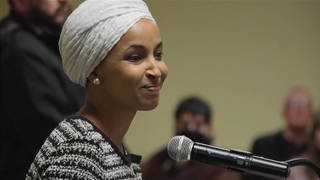
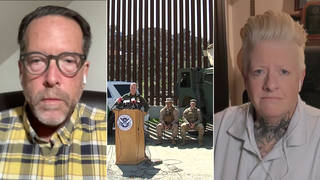
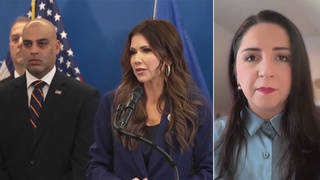





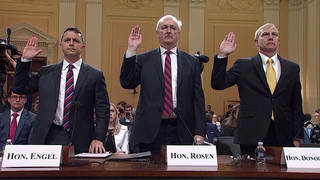

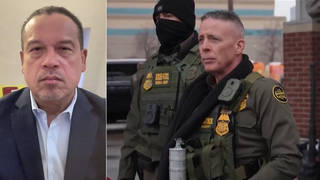
Media Options